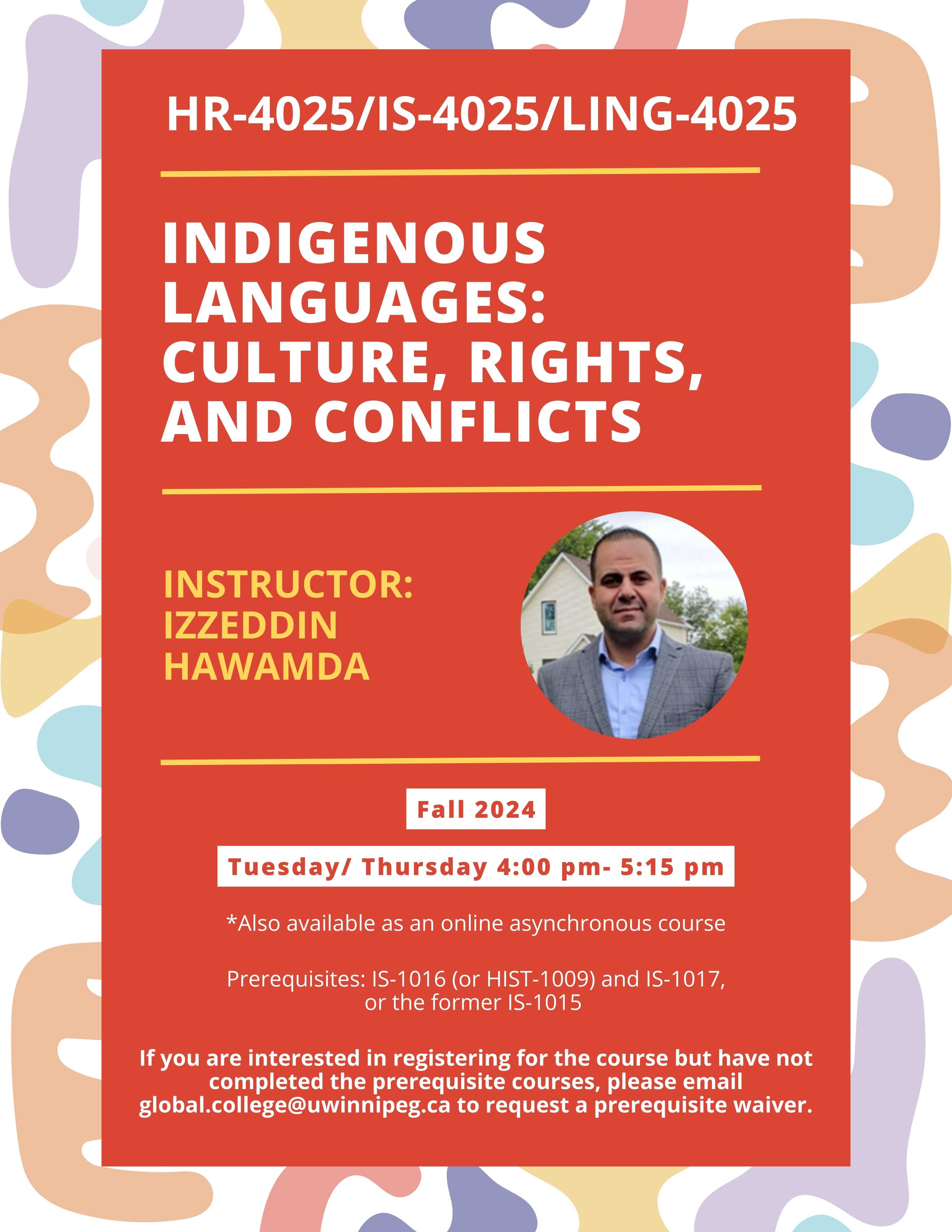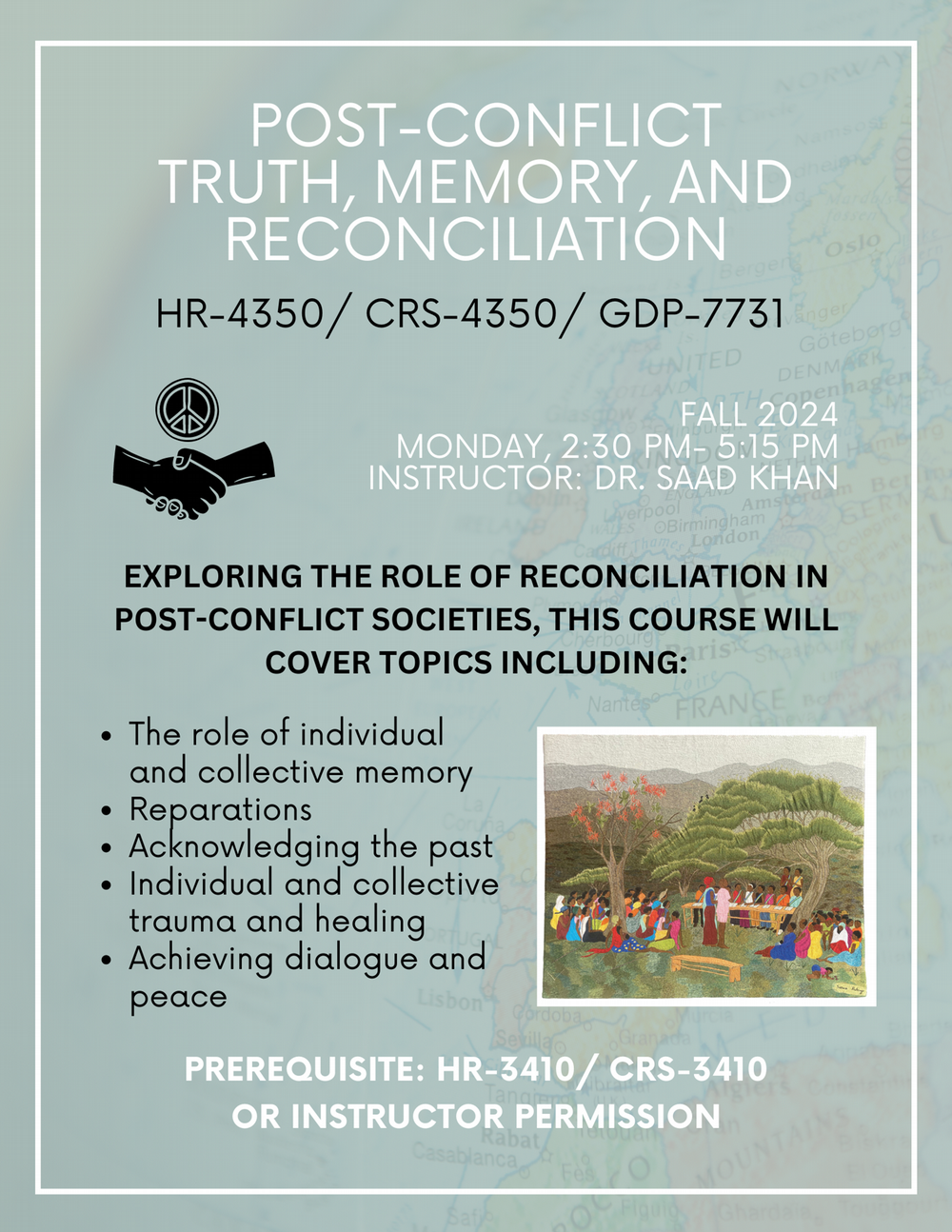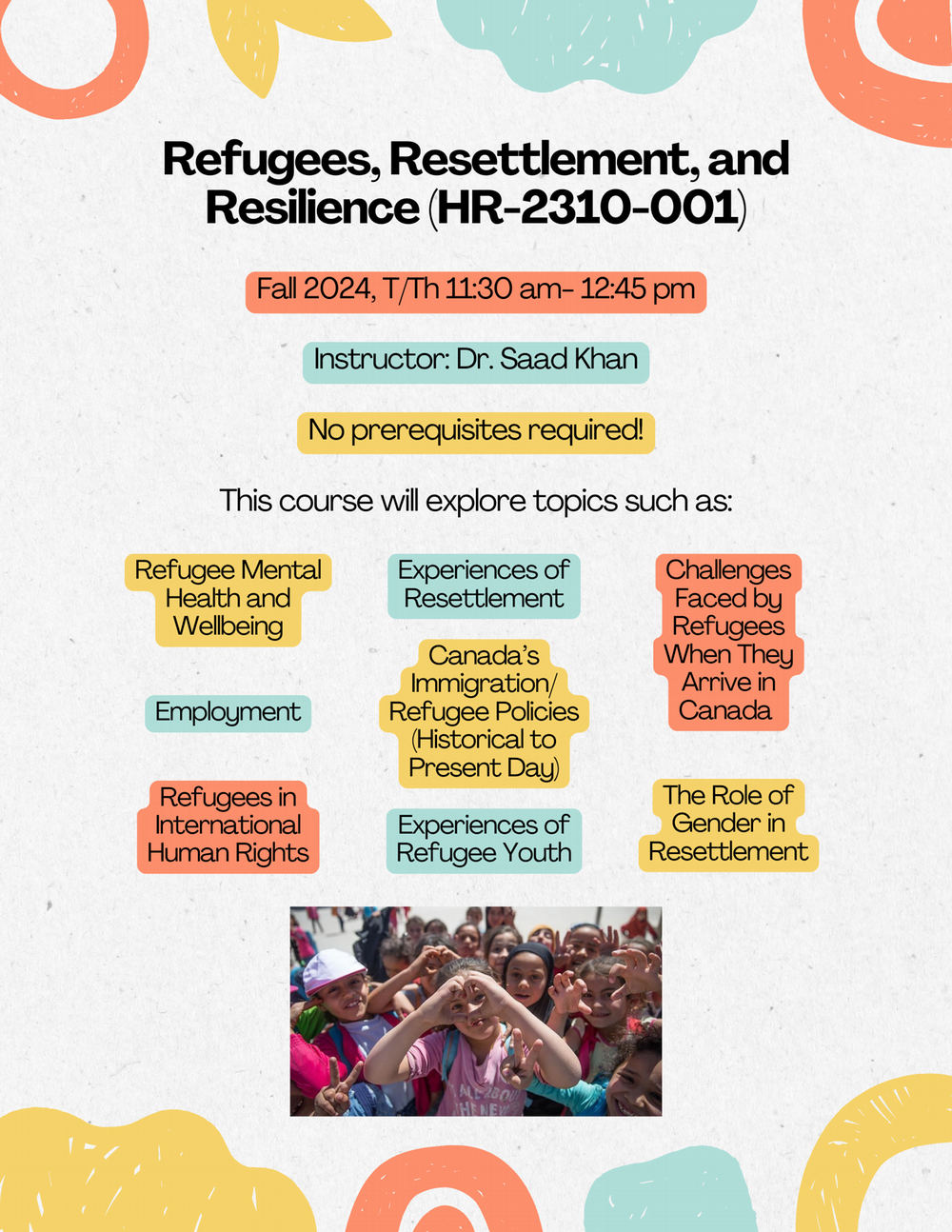Fall 2024/ Winter 2025 Human Rights Courses
Fri. Aug. 16, 2024
The 2024-25 timetable is now available and open course registration has started. Students can register for upcoming Fall and Winter courses on WebAdvisor. Please contact the Global College Office Coordinator at global.college@uwinnipeg.ca if you have any questions about our courses.
Updated August 23, 2024
Global College's Human Rights Program will be offering the following courses in the Fall 2024 and Winter 2025 terms:
Introduction to Global Citizenship (Fall 2024; Winter 2025)
Concepts and Conventions in Human Rights (Fall 2024; Winter 2025)
History of Human Rights in Canada (Fall 2024; Winter 2025)
Refugees, Resettlement, and Resilience (Fall 2024)
Indigenous Languages: Culture, Rights, and Conflicts (Fall 2024)
Global Human Rights Advocacy (Winter 2025)
Human Rights Institutions (Winter 2025)
Models of Transitional Justice (Winter 2025)
Practicum in Human Rights (Fall 2024; Fall-Winter 2024-25; Winter 2025)
Human Rights Approaches to Health (Winter 2025)
Capstone in Human Rights (Winter 2025)
Fall 2024
HR-1200-510 Introduction to Global Citizenship (3 credits)
M/W/F 9:30 am- 10:20 am
Instructor: Dr. Matthew Hamilton
In this course students trace the historical development of the idea of "global citizenship," interrogating the meanings, contradictions and contentions associated with this term. Through guest speakers and student research on specific issues and injustices that are present in Manitoba communities, and which also have global connections or manifestations, students examine current practices aimed at fostering global citizenship. The future of concepts related to global citizenship is addressed by analyzing rights and democratic citizenship and asking how such rights should be articulated and advanced. Cross-listed: IDS-1200
HR-2100-001 Concepts and Conventions in Human Rights (3 credits)
T/Th 10:00 am- 11:15 am
Instructor: Dr. Matthew Hamilton
The course explores the historical development of human rights concepts and the major international human rights conventions and instruments. Students become familiar with the breadth of the landscape of human rights including political, civil, social, economic and cultural rights.
HR-2200-001 History of Human Rights in Canada (3 credits)
M/W 2:30 pm- 3:45 pm
Instructor: Dr. Kristi Kenyon
This course examines the history of human rights within the Canadian context including key federal, provincial and municipal legislation as well as critical human rights institutions. The course explores the evolution of the human rights in Canada in relation to their international counterparts, and historical discrimination in Canada in areas such as immigration, employment and housing, internment of minority populations, gender, sexuality, anti-Semitism and treatment of Indigenous peoples. Cross-listed: HIST-2512(3)
*Fulfills the UW Humanities Requirement *Zero Textbook Cost Course
HR-2200-002 History of Human Rights in Canada (3 credits)
T/Th 2:30 pm- 3:45 pm
Instructor: Dr. Saad Khan
This course examines the history of human rights within the Canadian context including key federal, provincial and municipal legislation as well as critical human rights institutions. The course explores the evolution of the human rights in Canada in relation to their international counterparts, and historical discrimination in Canada in areas such as immigration, employment and housing, internment of minority populations, gender, sexuality, anti-Semitism and treatment of Indigenous peoples. Cross-listed: HIST-2512(3)
HR-2310-001 Refugees, Resettlement, and Resilience (3 credits)
T/Th 11:30 am- 12:45 pm
Instructor: Dr. Saad Khan
Drawing on interdisciplinary literatures of forced migration and social inclusion, this course examines the challenges and opportunities that people encounter in rebuilding their lives after forced displacement. While considering experiences of forced migration around the world, the course focuses primarily on the experiences of refugees in Canada related to social integration, employment and public services. Students learn to employ key concepts from the literatures in order to analyze case studies and strategies to improve services for and integration of refugees in local communities.
HR-3510-001 Practicum in Human Rights (3 credits)
Instructor: Ruth Taronno
In the Practicum, students integrate theory and classroom knowledge with practice through supervised field work and structured assignments and reflections. The practicum involves volunteer work related to Human Rights in a relevant organization, and participation in specified seminars and/or written analyses. Note: Enrolment is subject to approval of a practicum proposal submitted by a student with a declared major in Human Rights. Interested students are advised to consult the Human Rights Coordinator well in advance of the term in which they wish to enroll.
Requisites: HR-2100 and HR-2200
*Zero Textbook Cost Course
HR-3511-001 International Practicum in Human Rights (6 credits)
Instructor: Ruth Taronno
In the International Practicum students integrate theory and classroom knowledge with practice through supervised field work and structured assignments and reflections. The practicum involves 3 months of a minimum of 30 weekly hours of volunteer work related to Human Rights in a relevant organization in an international setting, and participation in specified seminars and/or written analyses. Interested students are advised to consult with the Human Rights Practicum Coordinator well in advance of the term in which they wish to enroll.
Requisites: HR-2100 and HR-2200
*Zero Textbook Cost Course
HR-4025-750 Indigenous Languages: Culture, Rights, and Conflicts (3 credits)
Online Asynchronous
Instructor: Izzeddin Hawamda
Indigenous languages are an integral part of Indigenous peoples' identity, worldview and culture. It is however, currently estimated that up to ninety per cent of the world's Indigenous languages are likely to disappear by the end of the century. This course is designed to give students an overview of Indigenous language issues related to culture, advocacy, revitalization, and resistance. Students are encouraged to critically compare and contrast the treatment of Indigenous languages through legislation, policy, grassroots activism, and educational and systemic efforts in countries such as Canada, the United States, New Zealand, Norway, and Sweden. Cross-listed: LING-4025(3), IS-4025(3)
Requisites: IS-1016 (or HIST-1009) and IS-1017, or the former IS-1015

HR-4025-001 Indigenous Languages: Culture, Rights, and Conflicts (3 credits)
T/Th 4:00 pm- 5:15 pm
Instructor: Izzeddin Hawamda
Indigenous languages are an integral part of Indigenous peoples' identity, worldview and culture. It is however, currently estimated that up to ninety per cent of the world's Indigenous languages are likely to disappear by the end of the century. This course is designed to give students an overview of Indigenous language issues related to culture, advocacy, revitalization, and resistance. Students are encouraged to critically compare and contrast the treatment of Indigenous languages through legislation, policy, grassroots activism, and educational and systemic efforts in countries such as Canada, the United States, New Zealand, Norway, and Sweden. Cross-listed: LING-4025(3), IS-4025(3)
Requisites: IS-1016 (or HIST-1009) and IS-1017, or the former IS-1015

HR-4350-001 Post-Conflict Truth, Memory, and Reconciliation (3 credits)
M 2:30 pm- 5:15 pm
Instructor: Dr. Saad Khan
The suffering from atrocities during war-time is often seen as producing lingering individual and collective trauma, contributing to either personal dysfunction or successive cycles of violence where oppressed groups become the perpetrators in future regimes or conflicts. This course probes the role of memory in transitional societies, with particular emphasis on using memory to strengthen mechanisms for justice and human rights. Reconciliation projects, ranging from community-based initiatives to formal legislated undertakings such as truth and reconciliation commissions are examined in depth. Cross-listed: CRS-4350(3)
Requisites: HR-3410, CRS-3410, or permission of the instructor
Fall 2024/ Winter 2025
HR-3510-002 Practicum in Human Rights (6 credits)
Instructor: Ruth Taronno
In the Practicum, students integrate theory and classroom knowledge with practice through supervised field work and structured assignments and reflections. The practicum involves volunteer work related to Human Rights in a relevant organization, and participation in specified seminars and/or written analyses. Note: Enrolment is subject to approval of a practicum proposal submitted by a student with a declared major in Human Rights. Interested students are advised to consult the Human Rights Coordinator well in advance of the term in which they wish to enroll.
Requisites: HR-2100 and HR-2200
*Zero Textbook Cost Course
HR-3510-003 Practicum in Human Rights (3 credits)
Instructor: Ruth Taronno
In the Practicum, students integrate theory and classroom knowledge with practice through supervised field work and structured assignments and reflections. The practicum involves volunteer work related to Human Rights in a relevant organization, and participation in specified seminars and/or written analyses. Note: Enrolment is subject to approval of a practicum proposal submitted by a student with a declared major in Human Rights. Interested students are advised to consult the Human Rights Coordinator well in advance of the term in which they wish to enroll.
Requisites: HR-2100 and HR-2200
*Zero Textbook Cost Course
Winter 2025
HR-1200-518 Introduction to Global Citizenship (3 credits)
T/Th 2:30 pm- 3:45 pm
Instructor: Dr. Lloyd Kornelsen
In this course students trace the historical development of the idea of "global citizenship," interrogating the meanings, contradictions and contentions associated with this term. Through guest speakers and student research on specific issues and injustices that are present in Manitoba communities, and which also have global connections or manifestations, students examine current practices aimed at fostering global citizenship. The future of concepts related to global citizenship is addressed by analyzing rights and democratic citizenship and asking how such rights should be articulated and advanced. Cross-listed: IDS-1200
HR-2100-002 Concepts and Conventions in Human Rights (3 credits)
M/W 2:30 pm- 3:45 pm
Instructor: TBA
The course explores the historical development of human rights concepts and the major international human rights conventions and instruments. Students become familiar with the breadth of the landscape of human rights including political, civil, social, economic and cultural rights.
HR-2200-003 History of Human Rights in Canada (3 credits)
M/W/F 9:30 am- 10:20 am
Instructor: TBA
This course examines the history of human rights within the Canadian context including key federal, provincial and municipal legislation as well as critical human rights institutions. The course explores the evolution of the human rights in Canada in relation to their international counterparts, and historical discrimination in Canada in areas such as immigration, employment and housing, internment of minority populations, gender, sexuality, anti-Semitism and treatment of Indigenous peoples. Cross-listed: HIST-2512(3)
HR-2200-004 History of Human Rights in Canada (3 credits)
F 2:30 pm- 5:15 pm
Instructor: TBA
This course examines the history of human rights within the Canadian context including key federal, provincial and municipal legislation as well as critical human rights institutions. The course explores the evolution of the human rights in Canada in relation to their international counterparts, and historical discrimination in Canada in areas such as immigration, employment and housing, internment of minority populations, gender, sexuality, anti-Semitism and treatment of Indigenous peoples. Cross-listed: HIST-2512(3)
HR-2540-001 Global Human Rights Advocacy (3 credits)
T 6:00 pm- 9:00 pm
Instructor: TBA
This course provides knowledge and strategies for addressing current human rights topics. Through the readings from the literature of community engagement and activist assignments participants build awareness, develop confidence and acquire the tools to effectively engage in human rights campaigns. This course links participants to national and international social justice and human rights organizations working on related issues.
HR-3210-001 Human Rights Institutions (3 credits)
T/Th 10:00 am- 11:15 am
Instructor: Dr. Matthew Hamilton
This course analyzes the role of specialized Canadian and international human rights institutions, such as human rights commissions and tribunals. The course provides an understanding of the legislative frameworks for select institutions and procedures for accessing selected human rights institutions, and assesses the societal impact of such commissions and tribunals through their educational functions as well as case decisions.
Requisites: HR-2100 or HR-2200
HR-3410-001 Models of Transitional Justice (3 credits)
T/Th 11:30 am- 12:45 pm
Instructor: Dr. Saad Khan
This course examines transitional justice, the processes by which societies deal with the legacy of widespread human rights abuses after a period of oppression or violent conflict in order to achieve the transition to a just and stable society. The course investigates a variety of transitional justice mechanisms, such as reparations, truth commissions, reconciliation activities, and criminal tribunals.
Requisites: HR-2100 or HR-2200
HR-3510-004 Practicum in Human Rights (3 credits)
Instructor: Ruth Taronno
In the Practicum, students integrate theory and classroom knowledge with practice through supervised field work and structured assignments and reflections. The practicum involves volunteer work related to Human Rights in a relevant organization, and participation in specified seminars and/or written analyses. Note: Enrolment is subject to approval of a practicum proposal submitted by a student with a declared major in Human Rights. Interested students are advised to consult the Human Rights Coordinator well in advance of the term in which they wish to enroll.
Requisites: HR-2100 and HR-2200
*Zero Textbook Cost Course
HR-3511-002 International Practicum in Human Rights (6 credits)
Instructor: Ruth Taronno
In the International Practicum students integrate theory and classroom knowledge with practice through supervised field work and structured assignments and reflections. The practicum involves 3 months of a minimum of 30 weekly hours of volunteer work related to Human Rights in a relevant organization in an international setting, and participation in specified seminars and/or written analyses. Interested students are advised to consult with the Human Rights Practicum Coordinator well in advance of the term in which they wish to enroll.
Requisites: HR-2100 and HR-2200
*Zero Textbook Cost Course
HR-4001-001 Capstone in Human Rights (3 credits)
M 2:30 pm- 5:15 pm
Instructor: Dr. Saad Khan
This capstone course examines theories and practices of human rights and contemporary global issues, and evaluates on-going cultural, economic, religious, legal, sociological and ideological debates that continue to influence the evolution of human rights. The course is taught within a multidisciplinary theoretical framework. This seminar provides a forum for synthesis and reflection on the human rights degree including integration of experiential and theoretical knowledge gained through the practicum and coursework. Note: Students must have declared a major in Human Rights to take this course.
Requisites: HR-3510 or permission of the instructor
HR-4450-001 Health and Human Rights
W 2:30 pm- 5:15 pm
Instructor: Dr. Kristi Kenyon
This course identifies, locates, and examines the complicated intersection between human rights and health in law, policy, and lived reality. Taught from a multi-disciplinary framework, the course analyzes the content, justiciability and realization of international right to health provisions and the meaning of these provisions in different cultural and socio-economic contexts. Through contemporary debates and case studies, the course examines the interaction between various human rights approaches (cultural rights, right to development, environmental rights, women's rights, Indigenous rights) and health approaches (public health, global health, environmental health, social determinants of health).
Requisites: HR-2100 and HR-2200

